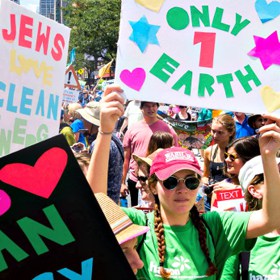by Rachel Aronson – JOFEE / Sustainability and Community Engagement Fellow, Hazon
Jews across the world this week commemorated leaving Egypt to become free people for the holiday of Passover. Friends and family sit around the table together for the seder, celebrating freedom with comfy pillows to recline on and lots of kosher wine.
Unfortunately, Passover can also represent something else: the holiday of waste.
Those who keep kosher for Pesach (Passover) deep-clean our kitchens before the holiday, rooting out bread, tortillas, muffins, crackers, and every other kind of chametz (leavened or yeasted products) that’s sitting around the house. And to ensure that everything is kosher, we switch out our regular sets of dishes with a special set of only-for-Passover dishes.
But who wants to keep an extra set of dishes around the house? It takes up storage space. It’s inconvenient. Understandably, many of us – out of convenience, or out of necessity – use disposable plates, cutlery, cups, and more. Ironically, many of us end up celebrating this holiday of freedom and liberation with trash bags full of styrofoam.
Thankfully, Passover is also a holiday that reminds us of our ability to make change — as individuals and as a society.
Nowhere is change more visible than in Moshe Rabeinu’s transition from an adopted son in Pharoah’s household to legendary leader of the exodus from Egypt. First, Moshe observes something that he knows is wrong: “[Moshe] went out to his kinsfolk and witnessed their labors. He saw an Egyptian beating a Hebrew, one of his kinsmen.” (Exodus 2:11). Witnessing this injustice then pushes Moshe to change his life. He thrashes out in anger, killing an Egyptian taskmaster; he runs away from the palace to become a shepherd; he educates himself and, with the help of God, becomes a leader capable of ending the enslavement of the Israelites in Egypt.
We, too, have the capacity to make prophetic change in our relationship to the world through Passover. This year, follow in Moshe’s footsteps and take strides towards renewing and increasing your responsibility for our planet’s future.
One example: during a family Seder this year, my aunt provided stickers for everyone to use to mark their disposable cups. These stickers ensured that we only used one disposable cup each, as opposed to dozens.
And in two weeks, as we count the Omer, I will be heading down to Washington, DC to march with Hazon and Jewish communities around the country at the People’s Climate March and Shabbat. With federal climate protection in question, this is an important step in maintaining our role as shomrei adamah, planet protectors. Interested in joining us? Click here for more info on A Week of Action for the Earth, April 22-29, including Earth Day and the People’s Climate Shabbats.
As we travel through Pesach, let’s all try, in whatever ways that we can, to take an action, big or small, that reminds you that we are all responsible for the planet and each other. We all have the potential to make change.
__
Rachel Aronson is an educator, dialogue facilitator, and nature lover living in Brooklyn. She has worked on a community farm, lived in an environmental co-op, and planted gardens on her fire escape to bridge her passions for building community and being around fresh-grown vegetables, and is a member of Repair the World NYC‘s Advisory Board.
Editor’s Note: Welcome to D’varim HaMakom: The JOFEE Fellows Blog! Most weeks throughout the year, you’ll be hearing from the JOFEE Fellows: reflections on their experiences, successful programs they’ve planned and implemented, gleanings from the field, and connections to the weekly Torah portion and what they’ve learned from their experiences with place in their host communities for the year. Views expressed are the author’s and do not necessarily represent Hazon. Be sure to check back weekly!





Comments are closed.